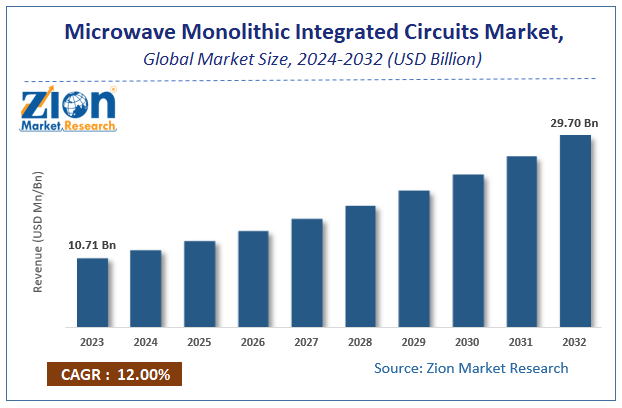Monolithic Microwave Integrated Circuits Market Size, Share, 2032

By 2032, the global market for microwave monolithic integrated circuits is expected to have grown from its 2023 valuation of approximately USD 10.71 billion to USD 29.70 billion, with a compound annual growth rate (CAGR) of approximately 12% between 2024 and 2032. The report offers historical data from 2018 to 2022 as well as a revenue-based estimate from 2024 to 2032 (USD billion). Global and regional market forecasts and analyses for microwave monolithic integrated circuits are covered in the study.
✈👉Get a Free Sample: 🚀https://www.zionmarketresearch.com/sample/microwave-monolithic-integrated-circuits-market
Abstract:
The Microwave Monolithic Integrated Circuits (MMIC) Market is witnessing significant growth due to the increasing demand for high-performance communication systems, particularly in the fields of telecommunications, defense, and aerospace. MMICs are crucial in applications requiring high-frequency signal processing, such as satellite communications, radar systems, and 5G wireless networks. This article provides an in-depth analysis of the MMIC market’s growth drivers, challenges, trends, and technological advancements, along with regional market dynamics and forecasts from 2024 to 2030.
Introduction
- Overview of MMICs: MMICs are integrated circuits that combine passive and active components on a single substrate. These circuits operate at microwave frequencies, typically between 300 MHz and 300 GHz.
- Market Definition: The MMIC market involves the design, manufacturing, and application of these circuits for various high-frequency applications, including telecommunications, aerospace, defence, and automotive industries.
Market Overview for Microwave Monolithic Integrated Circuits
One kind of integrated circuit (IC) that functions at microwave frequencies, usually between 300 MHz and 300 GHz, is called a microwave monolithic integrated circuit (MMIC). Semiconductor materials like silicon carbide (SiC), gallium arsenide (GaAs), or gallium nitride (GaN) are used to manufacture these circuits because they operate better at high frequencies than silicon-based technology. MMICs provide small, dependable, and high-performing solutions for microwave and millimetre-wave applications by combining several functionalities, including amplifiers, mixers, oscillators, and switches, onto a single chip. They are extensively utilised in defensive electronics, satellite communications, radar systems, and telecommunications.

Facts about the Microwave Monolithic Integrated Circuits Market
In order to eliminate the cavities, tubes, and discrete devices used in communications systems and microwave radar, the Défense Advanced Research Projects Agency launched the first significant attempt to create solid-state microwave integrated circuits in 1980. The development of monolithic microwave integrated circuit (MMIC) technology was spurred by advancements in semiconductor fabrication and materials.
Market Growth Factors for Microwave Monolithic Integrated Circuits
Microwave monolithic integrated circuits are more reproducible and have a higher reliability rate than traditional integrated circuits. Utilising microwave monolithic integrated circuits also has the advantages of being lightweight and small in size. Additionally, they allow for multi-octave functioning, which raises the product’s demand. Additionally, because microwave monolithic integrated circuits operate across a wider microwave range, their applications are growing, which propels the market’s expansion. The market for microwave monolithic integrated circuits is also expanding as a result of ongoing research and development efforts in this field as well as higher usage brought about by lower pricing. Microwave monolithic integrated circuits are difficult to manufacture due to their tiny size and sophisticated manufacturing process, which restricts small and medium-sized businesses from producing them.

Market Segmentation for Microwave Monolithic Integrated Circuits
The worldwide market for microwave monolithic integrated circuits is divided into segments based on application, IC type, and technology. The global market is divided into two segments based on technology: Si technology and GaAs technology. Large, medium, and small integrated circuits are the three categories into which the market is divided based on the type of IC. The market is segmented by application, including consumer electronics, defence, automation, IT and telecommunications, aerospace, and others.
✈👉Directly Purchase a copy of the report with TOC: 🚀https://www.zionmarketresearch.com/toc/microwave-monolithic-integrated-circuits-market
Market Analysis of Microwave Monolithic Integrated Circuits: Report Scope

Market Analysis by Region for Microwave Monolithic Integrated Circuits
The North American region dominates the market for microwave monolithic integrated circuits. The existence of well-known market participants in this area is the main driver of this expansion. The Asia Pacific region is lagging behind North America because of the large number of new vendors that are appearing there. China, a developing country, is having a significant impact on the Asia Pacific market for microwave monolithic integrated circuits.
Market Dynamics
- Drivers:
- Restraints:
- Opportunities:
3. Market Segmentation
- By Application:
- By Frequency Range:
- By Region:
Competitive Landscape
- Key players in the MMIC market include: Qorvo, Inc.Analog Devices, Inc.Skyworks Solutions, Inc.Broadcom Inc. NXP SemiconductorsMACOM Technology SolutionsTeledyne Microwave Solutions
These companies are involved in the development and commercialization of MMICs, focusing on innovations in process technologies, miniaturization, and integration with emerging communication technologies.
Technological Trends
- Miniaturization and Integration: There is a growing trend towards integrating multiple functions (such as amplifiers, mixers, and oscillators) into a single MMIC chip to reduce size, power consumption, and manufacturing costs.
- Advances in Materials: The use of materials like gallium arsenide (GaAs) and gallium nitride (GaN) for MMICs is becoming more common due to their ability to handle high power and high-frequency signals efficiently.
- Wideband and Multi-band Capabilities: As communication systems evolve, there is increasing demand for MMICs that can operate across multiple frequency bands simultaneously.
Market Outlook and Forecast
The Microwave Monolithic Integrated Circuits (MMIC) Market is expected to grow at a compound annual growth rate (CAGR) of around 8–10% from 2024 to 2030. The growth is primarily driven by the advancements in telecommunications (particularly 5G), aerospace and defence applications, and increasing adoption of MMICs in automotive and industrial applications.
Conclusion
The MMIC market is poised for strong growth in the coming years, fuelled by technological advancements and the increasing demand for high-performance circuits in a variety of industries. Despite challenges like high manufacturing costs and complex design processes, innovations in materials and design techniques are expected to drive market expansion. Key players are focusing on research and development to enhance product offerings and expand their market share.
✈👉Enquiry for buying: 🚀https://www.zionmarketresearch.com/inquiry/microwave-monolithic-integrated-circuits-market
✍Browse other trend reports:
https://janegabriel53.medium.com/voice-recording-devices-market-size-share-2032-11dd5972e44d
https://itocharlene.medium.com/inverter-market-for-digital-applications-size-share-2032-ba887163f2fb
📞Contact Us:
Zion Market Research212
USA/Canada Toll Free: 1 (855) 465–4651
Network: 1 (302) 444–016611\
📲Web: https://www.zionmarketresearch.com/
👉Blog: https://zmrblog.com/
Comments
Post a Comment